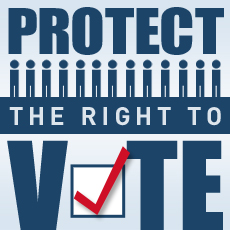
Criminal disfranchisement proved to be a hot issue in the Republican presidential debates recently, leading to a asking, ÔÇťShould felons be allowed to vote after serving their sentences?ÔÇŁ
The results showed that the majority feel that those with past convictions should have that right. The Washington Post also on the issue Friday, making the point that it is unjust to prevent ÔÇťindividuals from having a full stake and a full voice in the community and its leadershipÔÇŁ after they have already paid their debts to society and earned their right to freedom.
Additionally, the Post ran an by Charles Colson, founder of the Prison Fellowship and former counsel to President Richard Nixon who also saw no point in denying the right to vote for those who have already served their time.
ÔÇťVoting does not put anyone in danger,ÔÇŁ he wrote. ÔÇťSound public policy would teach us that if we want to turn ex-offenders into responsible citizens, we must demand of them responsible behavior. And once they demonstrate responsible behavior, what possible justification is there, beyond scoring political points during an election, for stripping them of their civil rights for the rest of their lives?ÔÇŁ
Criminal disfranchisement laws, like recent laws requiring ID to vote or restricting third-party registration of voters, have a disproportionate and unfair impact on minorities. Criminal disfranchisement laws have their roots in the Jim Crow era and their harmful effects continue today as 13 percent of African-American men have lost their right to vote ÔÇô a rate seven times the national average. Similarly, Latino citizens are also disproportionally disfranchised because they are over-represented in the criminal justice system.
Due to these laws in states throughout the nation, an estimated 5.3 million citizens cannot vote, and nearly four million of those are not in prison but working in our communities. The Democracy Restoration Act, which has been , would eliminate the confusion around these laws and restore the right of millions to vote in federal elections.
ÔÇťCitizens should not be denied their right to vote due to a past criminal conviction,ÔÇŁ said Deborah J. Vagins, └¤░─├┼┐¬Ż▒Żß╣ű senior legislative counsel. ÔÇťThey are working, paying taxes, raising families and living in our communities. They deserve to have a voice.ÔÇŁ
Criminal disfranchisement laws are another example of voter suppression tactics that threaten our democracy. Our government shouldnÔÇÖt be in the business of deciding whose vote matters most. Elected officials should be seeking ways to encourage more Americans to vote, not erecting barriers to deny voters the access to the ballot.
to act now to restore one of our most fundamental rights by supporting the Democracy Restoration Act.
Learn more about voting rights: Sign up for breaking news alerts, , and .

